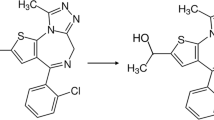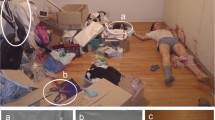Abstract
Caffeine is not usually perceived as a drug by most people because it is found in many foods and drinks, including caffeinated energy drinks, as well as in over the counter analgesics and cold preparations. Recently in Poland it has become increasingly common to take pure caffeine, bought through online stores, as a psychoanaleptic. This creates a much higher risk of severe and even fatal poisoning in comparison with the risk associated with the abuse of food products and non-prescription medicines containing low doses of caffeine. This paper presents three different cases of poisoning that occurred when pure caffeine was taken as psychostimulant; in cases 1 and 2 poisoning was the result of a single overdose, while in the case 3 poisoning resulted from a cumulative overdose. In the case 1 there was a severe intoxication (persistent vomiting, hypotension, tremor), and the concentration of caffeine in the blood was found to be 80.16 μg/mL. The patient was treated using hemodialysis, which caused a rapid decrease in blood levels of caffeine and relief of the clinical symptoms of poisoning. Cases 2 and 3 were fatal poisonings, and recorded levels of caffeine in post mortem blood samples were 140.64 μg/mL and 613.0 μg/mL. In case 2 the patient died 10 min after admission to hospital as a result of sudden cardiac arrest, which was preceded by an attack of convulsions, and in case 3 death occurred in home and was also sudden in nature. Taking pure caffeine as a stimulant is associated with a high risk of overdose and the development of serious and even fatal poisoning, and those using pure caffeine are generally completely unaware of these risks. In such cases, death is usually sudden due to functional mechanisms.
Similar content being viewed by others
References
Engebretsen KM, Harris CR. Caffeine and related nonprescription sympathomimetics. In: Ford MD, Delaney KA, Ling LJ, Erickson WB, editors. Clinical toxicology. Philadelphia: Saunders Company; 2001. p. 310–5.
Leikin JB, Paloucek FP. Poisoning & toxicology handbook. Hudson: Lexi-Comp Inc.; 2002. p. 311–2.
Musgrave IF, Farrington R, Hoban C, Byard RW. Caffeine toxicity in forensic practice: possible effects and under-appreciated sources. Forensic Sci Med Pathol. 2016;12:299–303.
Curatolo PW, Robertson D. The health consequences of caffeine. Ann Intern Med. 1983;98:641–53.
Mack RB. A tasteless proposal: Caffeine overdose. Am J Med. 1990;89:368.
Jabbar SB, Hanly MG. Fatal caffeine overdose: a case report and review of literature. Am J Forensic Med Pathol. 2013;34:321–4.
Rudolph T, Knudsen K. A case of fatal caffeine poisoning. Acta Anaesthesiol Scand. 2010;54:521–3.
Campana C, Griffin PL, Simon EL. Caffeine overdose resulting in severe rhabdomyolysis and acute renal failure. Am J Emerg Med. 2014;32(111):e3–4.
Kanfer I, Dowse R. Vuma V pharmacokinetics of oral decongestants. Pharmacotherapy. 1993;13:116S–28S.
Aranda JV, Collinge JM, Zinman R, Watters G. Maturation of caffeine elimination in infancy. Arch Dis Child. 1979;54:946–9.
Passmore AP, Kondowe GB, Johnston GD. Renal and cardiovascular effects of caffeine: a dose-response study. Clin Sci. 1987;72:749–56.
Rudy D, Lee S. Coffee and hypokalemia. J Fam Pract. 1988;26:679–80.
Snyder SH, Skylar P. Behavioral and molecular action of caffeine: focus on adenosine. J Psychiatr Res. 1984;18:91–106.
Ishigaki S, Fukasawa H, Kinoshita-Katahashi N, Yasuda H, Kumagai H, Furuya R. Caffeine intoxication successfully treated by hemoperfusion and hemodialysis. Intern Med. 2014;53:2745–7.
Holstege CP, Hunter Y, Baer AB, Savory J, Bruns DE, Boyd JC. Massive caffeine overdose requiring vasopressin infusion and hemodialysis. J Toxicol Clin Toxicol. 2003;41:1003–7.
Banerjee P, Ali Z, Levine B, Fowler DR. Fatal caffeine intoxication: a series of eight cases from 1999 to 2009. J Forensic Sci. 2014;59:865–8.
Yamamoto T, Yoshizawa K, Kubo S, Emoto Y, Hara K, Waters B, et al. Autopsy report for a caffeine intoxication case and review of the current literature. J Toxicol Pathol. 2015;28:33–6.
Author information
Authors and Affiliations
Corresponding author
Ethics declarations
The authors declare that they have no conflicts of interest.
For this type of study, formal consent is not required.
Rights and permissions
About this article
Cite this article
Magdalan, J., Zawadzki, M., Skowronek, R. et al. Nonfatal and fatal intoxications with pure caffeine – report of three different cases. Forensic Sci Med Pathol 13, 355–358 (2017). https://doi.org/10.1007/s12024-017-9885-2
Accepted:
Published:
Issue Date:
DOI: https://doi.org/10.1007/s12024-017-9885-2




